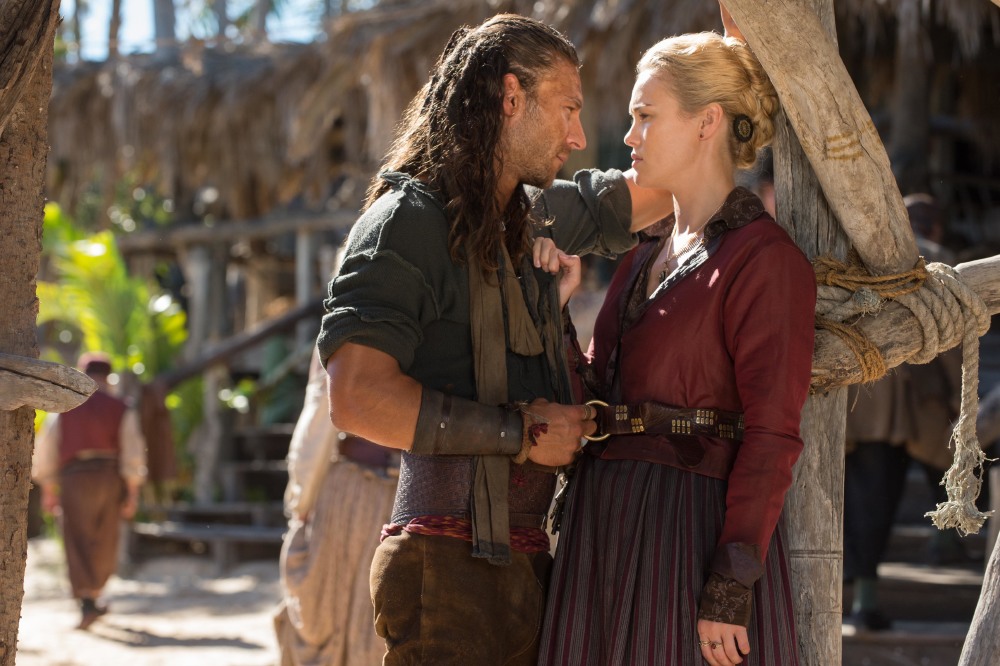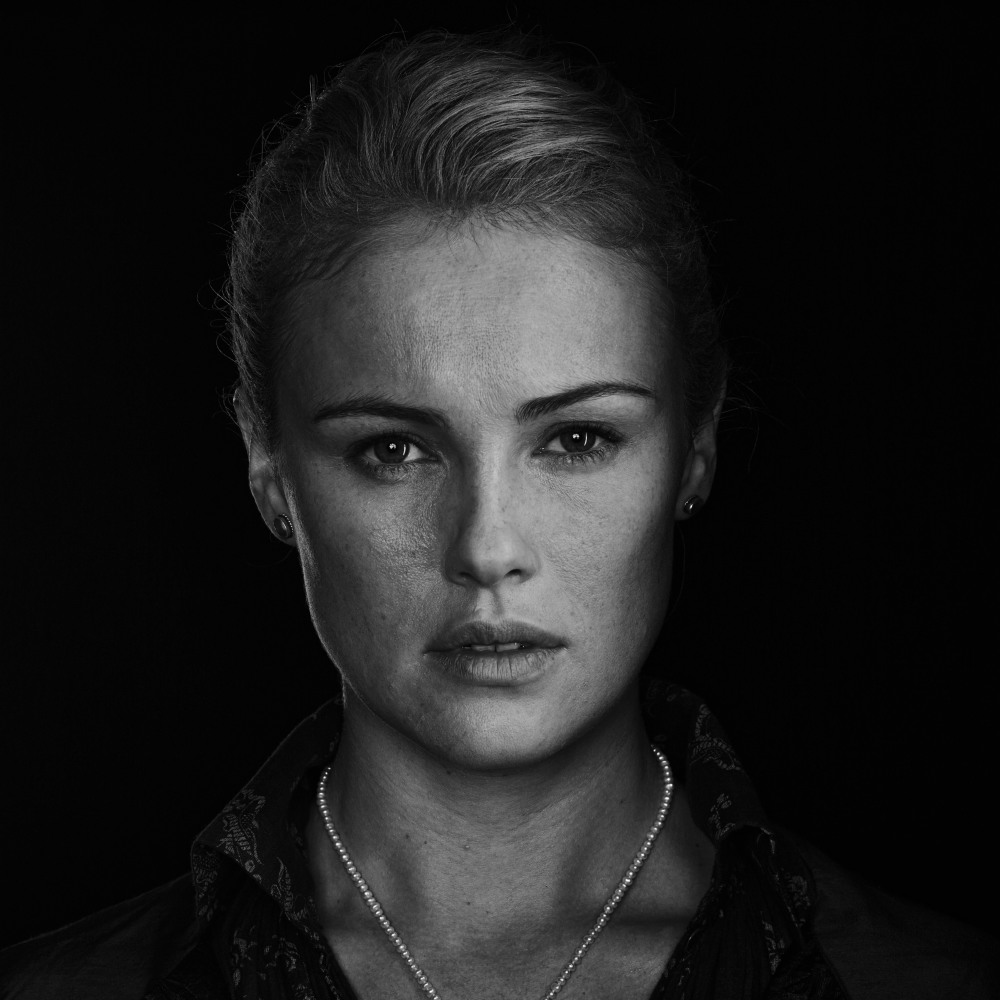Coming to UK television this month, Black Sails acts as a prequel to Robert Louis Stevenson's world-famous best-selling novel Treasure Island.
Set in the brutal, cut-throat golden age of 18th century piracy, Captain Flint (Toby Stephens) and his ruthless crew are followed as they fight for the survival of New Providence Island.

Star of the series Hannah New plays the daughter of the local smuggling kingpin, Eleanor Guthrie, and while men ruled the seas in this deadly world, it's the women who govern the land and sell on the goods.
Female First got the opportunity to put some questions to Hannah about the series, what attracted her to the role of Eleanor and more. Read on to find out what she had to say.
Black Sails is making its debut to UK television this July, what can you tell us about the show for those who have yet to see it?
Black Sails is a gritty representation of a section of history called major piracy that really does away with a lot of clichés of piracy. It represents a group of people that are abandoned in the new world and have to survive. It is a show that has something for everyone because it is everything from drama to love stories to action. It really captures people's imaginations. It so successfully interweaves fictional characters from Treasure Island and real characters from history.
What drew you to this series and your character Eleanor Guthrie?
Well I think for me when I first met Eleanor I really liked that this was a young woman unlike any other that we have seen portrayed in pirate dramas. She has grown up in a very violent and dangerous place and has seen a lot of suffering and therefore has found a way she can survive personally and fit into this island, playing a meaningful role in their survival. She is a really bright young business woman who sees a gap where she can wheel economical and political power and wheel a vision. Going forward with that vision of making this place an independent society that functions under its own laws and isn't completely tied to the colonial powers of White Hall in England. To me, I was really excited to play a young woman who was a visionary, a business woman and somebody that wasn't afraid to tell a room full of pirates where to stick it.

She's an incredibly compelling and determined woman and very much on the front line of the action a lot of the time which is great to see in a female character. This seems to be very much growing in television over time, how important is it for women to continue being shown in roles such as this?
I think it is so important. When I watch television or when I watch a film, those are the kind of characters that I become invested in. I think if you don't have characters that young women can be invested in and inspired by then you are really isolating a huge section of your audience. To be able to portray a woman who isn't completely subservient to the men that surround her is a really inspirational thing and I think a lot of young women in business find themselves in boardrooms full of men and probably hope that they can tell them how to run the ship in the same way. So yes, I think it is very important, especially when there are historical characters and there are vast sections of women in history who have never even been brought to light and focused on. It is really amazing to be a part of something like that.
The role's also been very strong in breaking down gender and sexuality barriers, how does it feel to be a part of that?
I think that is what is fascinating about this world. The women in this world don't necessarily have to conform to 19th century society norms. She doesn't have to be married to someone in order to have power. She is not bound by the societal laws, so she can be who she is and she can grow. Her relational alliances are completely free compared to a woman who grew up in London and probably couldn't even choose her own husband for love. Eleanor can choose whoever she wants to love and I think that is a very interesting thing to portray. When I was looking into the history of that time, there were a lot of romantic love letter writing between women, which when you read them were far more explicit than love letters you would read between a man and a woman. It has been underrepresented in film and television for a very long time and I think it is incredibly brave of the show to take on those types of representations with female characters, with viewers appreciating a more realistic representation of what peoples sexual lives would have been like in other time periods.
Were there any pressures you felt stepping into this role of portraying such a character?
Yes, there is a huge amount of pressure and I think that people are so quick to define representation of women, that in order to make that believable it is a massive challenge because you are challenging peoples preconceptions of how women were in that time. It was a massive leap for me as well from who I am and my background to imagining what it must have been like to grow up in that society and to be constantly be surrounded by threat and violence. I think a lot of people look at that and say 'would a woman really be able to will that type of power'. Women would have to wheel that type of power to survive because they are constantly being threatened with violence. You see it with Max as well; each of the women in the show will power in different ways. Max has become very gifted at wilding sexual power, which she uses to guide her intelligence and forward her business. You look at Anne Bonny, who is wilding physical power. She is a very skilled swordswomen and then you have Eleanor who has economical and political power. Each of the women in a way have found their niche of how they can maintain control. It's a huge amount of pressure, but I think all of us together kind of see how that must have been their reality and it was a way in which women could survive.

Did you have to do any research for this role? Tell us about that.
It's amazing how quickly you are cast and then you are thrown into filming. I had the Christmas period to do a whole lot of researching. I really threw myself into it to find little details that would help tell the story about women. It was very hard to find a specific woman to base her on, but the more you look into piracy and the more you realize how big of a role women played in piracy. There were very strong female pirates that were also businesswomen. I found it fascinating when I came across a character Grace O'Malley, an Irish pirate, who controlled trade routes off the coast of Ireland and England and became so powerful that there were times when she challenged the queen with the amount of money she made with these trade routes. For me, I suddenly realized that there were these women that found an opportunity for business and I just really love the fact that I had this huge wealth of history. I wasn't just looking specifically at 18th century women in the Caribbean. I was looking much broader of how women fitted into the business of piracy in general. Elizabethan was probably the earliest I looked because if you go back even further there were incredible Chinese pirates that were women that had fleets of 10,000 pirates. Throughout history women have been involved but they are just not as famous as Henry Avery or Charles Vane or any of the monsters involved with piracy.
What sort of training did you have to do for the big action scenes?
That was one of the things that really excited me about this role as well, that I would get to throw a few punches and become quite physically trained. I have loved throwing myself into those. I am always like when am I going to get a sword fighting scene. I have really embraced that she has to be someone who is very physically tough. She is someone who has seen so much violence, so it is something that she resorts to very easily. When Vane crosses her, her first reaction is to punch his lights out. She has this kind of deep seed of anger and the immediate result of that is violence. It is kind of like the opposite of me and it is really interesting trying to find that.
Despite being a series about pirates Black Sails feels like something much more than just that, how is it that the show propels itself to that level?
I think what we have done really successfully is not oversimplifying this section of history. It is a complicated story and political alliances change so much. You are constantly are drawing in little facts of history and weaving it into fictions. I think in a lot of ways it doesn't patronise the audience it really challenges them and asks them to sit up and pay attention, otherwise they are going to lose the thread of the way the plot is going. In that way it has become really successful because people become invested in knowing little clues and seeing and predicting which ways political alliances are going to form in the next few episodes. It keeps audiences on their toes and it is really exciting and people become invested in the surprises and the survival of these characters.
Finally, what's next for you?
At the moment I am just chilling in LA for a little bit. I have just been doing some production work on a film I did last year, which was a thriller with the director from the Blair Witch Project. It was very contemporary and an incredible experience, so I am really excited about that coming out hopefully in the fall. In the meantime, I'm going to do some hiking and take some down time.
Black Sails premieres on HISTORY on Tuesday 14th July at 10pm.

